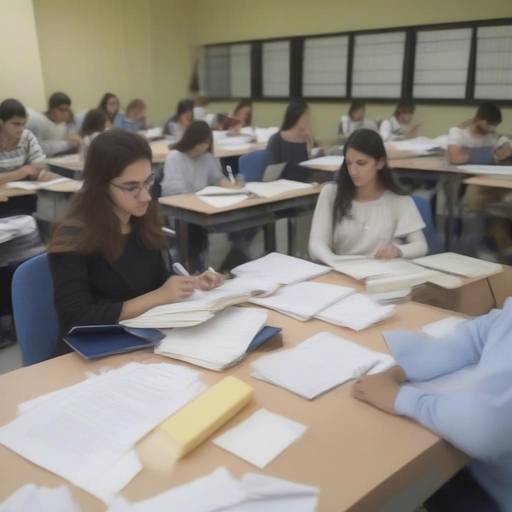
Study programs abroad are a unique opportunity for university students to explore new cultures, acquire intercultural skills and expand their academic horizons. However, it is also important to consider how these programs can affect university costs. In this article, we will explore in depth the impact of study programmes abroad on university costs, providing detailed information on opportunities, planning and savings in this context.
Opportunities for study programmes abroad
Study programs abroad offer students the opportunity to immerse themselves in different academic and cultural environments, allowing them to expand their global perspective and develop skills that are highly valued in the current labour market. International experiences not only enrich academic training, but also foster the personal and professional growth of students. In addition, participating in study programmes abroad can open doors to future employment opportunities by allowing students to develop networks of international contacts and linguistic skills.
Financial planning for study programmes abroad
Financial planning is essential to maximizing a study programme abroad. Costs associated with these programmes may include registration, accommodation costs, food, transportation, health insurance and personal expenses. It is essential to carefully evaluate these costs, investigate scholarships, grants, and financial aid programmes available, as well as explore temporary work options abroad. Early planning can help students and their families manage costs effectively and minimize the financial impact of a study program abroad.
Savings in study programmes abroad
The issue of savings is particularly relevant in the context of study programmes abroad, as associated costs can be significant. It is essential to explore savings strategies, such as the search for affordable accommodation, the use of discount cards for transportation, the preparation of home meals to reduce costs, among other measures. In addition, the selection of destinations and programs that fit the student's budget can help minimize costs.
History and Background
Study programmes abroad have a long history that goes back to the dawn of higher education. The first initiatives of academic exchange emerged in the nineteenth century, driven by a desire to foster intercultural understanding and international collaboration. Since then, these programmes have evolved significantly, adopting new pedagogical approaches and broadening their scope to include a variety of academic disciplines.
In the twentieth century, student exchange experienced significant growth due to advances in communications and transportation, which facilitated student mobility on a global scale. Study programs abroad became an integral part of the university experience for many students, giving them the opportunity to acquire a global perspective and develop intercultural skills.
In the twenty-first century, digitalization and globalization have further transformed the nature of study programmes abroad, allowing for greater connectivity and collaboration among educational institutions worldwide. These developments have expanded opportunities for students and encouraged cultural diversity in university classrooms.
Analysis in Deep
The impact of study programmes abroad on university costs entails a number of factors that should be carefully analyzed. On the one hand, these programs represent a significant investment, but at the same time they offer unique opportunities for personal and professional growth. It is crucial to weigh these aspects from a financial and academic perspective to make informed decisions.
At present, there is growing awareness of the importance of international experience in academia, which has led to an increase in the supply of study programmes abroad. This trend has led to greater competition among educational institutions, which in turn has led to the development of funding strategies and financial assistance for students wishing to participate in these programmes.
Comprehensive review
Comprehensive evaluation of the costs and benefits of study programmes abroad is critical for students and their families. In addition to considering the direct costs associated with the program, it is also important to analyse the possible long-term benefits, such as the development of intercultural skills, the improvement of the domain of a second language and the global network opportunities that may arise from these experiences. Understanding the complete picture is crucial to making informed decisions regarding study programmes abroad.
Comparative analysis
In comparing opportunities, planning and savings related to study programmes abroad, it is clear that there are significant differences depending on the destination, duration of the programme and associated costs. Some destinations may have higher living costs than others, which influences the total costs of the programme. Similarly, the availability of scholarships and financial aid varies between programmes and universities. This diversity of options offers students the opportunity to find a program that fits their financial and academic needs.
Practical Tips and Accessible Tips
- Comprehensive investigation: Before engaging with a study programme abroad, it is crucial to conduct a thorough investigation into available options, including possible scholarships, grants and temporary work opportunities abroad.
- Detailed budget: Develop a detailed budget that takes into account all costs, from enrolment to accommodation and transportation, will help students understand the magnitude of the investment and plan accordingly.
- Finding financial advice: Consulting with financial advisors or with the university's financial support department can provide valuable information on savings strategies and financing options available.
- Resource optimization: Find affordable accommodation options, explore transportation discounts and minimize personal expenses are effective ways to optimize financial resources during a study abroad program.
Industry Perspectives and Expert Reviews
"Experience abroad can be transformative for students, both personally and professionally. Although associated costs can be a concern, investing in a study program abroad can offer significant returns in terms of developing future skills and prospects." - Dr. Ana Gómez, Expert in International Education.
Case Studies and Practical Applications
**Case study 1:**Maria, an economic student, participated in a study program abroad in London. Although initially concerned about the associated costs, Maria obtained a partial scholarship that greatly mitigated the financial burden. During her experience, she developed a solid network of professional contacts that eventually helped her get an internship in a global company.
**Case study 2:**Juan, an architecture student, opted for a study program abroad in Barcelona. Although living costs were higher compared to his hometown, Juan decided to share accommodation with other international students to reduce expenses. This experience gave him a unique perspective on architectural design and allowed him to expand his portfolio with international projects.
Future Trends and Predictions
As the global educational environment continues to evolve, overseas curricula are expected to continue to play a crucial role in the formation of cosmopolitan and competent students in an increasingly interconnected world. It is anticipated that universities will continue to expand their offers of international programmes, while developing innovative strategies to facilitate the participation of students from different economic backgrounds. In addition, progress in technology and distance education is expected to provide new possibilities for the integration of international experiences in academic training, which could influence the costs and availability of study programmes abroad.
Conclusion
Study programmes abroad offer invaluable opportunities for the personal, academic and professional growth of students. While it is true that these programmes involve significant costs, the value of the experience and the opportunities they provide cannot be underestimated. Careful financial planning and active resource search can help manage costs effectively. Ultimately, the impact of a study program abroad goes beyond financial considerations, as it enriches the lives of students and contributes to their integral development.
Frequently asked questions
How can I get financial aid to participate in a study program abroad?
Universities and educational organizations often offer specific scholarships and grants for study programmes abroad. It is essential to investigate and apply these opportunities, in addition to seeking advice in the financial aid department of the educational institution.
What is the best way to prepare yourself financially for a study programme abroad?
Developing a detailed budget that includes all associated costs, from enrolment to daily expenses, is essential. Finding funding opportunities, such as scholarships, grants, and temporary work, can also help relieve the financial burden.
Are there study programmes abroad that are more affordable than others?
Yes, the affordability of study programs abroad varies depending on the destination, the duration of the program, and the financing options available. Researching different programs and destinations can help find more affordable options.
How can I maximize savings opportunities during a study program abroad?
Find affordable accommodations, use discounts on public transport, and prepare meals at home are effective ways to reduce costs during a study program abroad. In addition, exploring the possibility of temporary work or paid practices can help finance the experience.
Are there specific funding options for study programs abroad in my country?
Many countries have grants, scholarships, and educational loans that can be used to finance study programmes abroad. Consulting with the education department or local government agencies is essential to know the options available.
Is it possible to combine a study programme abroad with paid employment opportunities?
Some countries allow international students to work in a paid way during their studies. It is important to investigate employment regulations for students in the country of destination and explore possible job opportunities that are compatible with the study program.
In short, overseas curricula represent a valuable opportunity for university students, but they also require careful financial consideration and planning. By leveraging funding opportunities, optimizing resources and seeking savings, students can mitigate associated costs and maximize the benefits of this unique experience.






















































